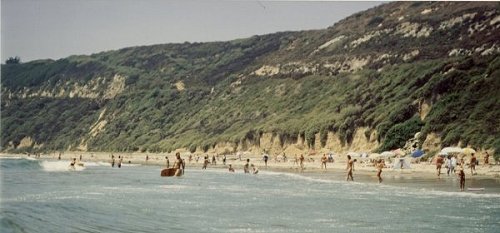
|
SCNA TRAVEL CORNER Travel Menu | So Cal Beaches | Hot Springs | Hiking | Other States| Cruises | Foreign Lands |
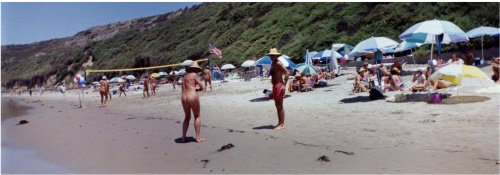
REMEMBERING BATES BEACH, 1950-2000
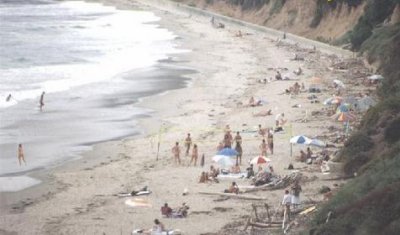 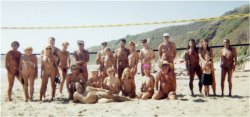 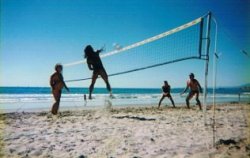    |
By Gary M., Nude Beach Alliance
Three years ago, the last of the nude beaches near Los Angeles was lost. After a tradition that had lasted over thirty years, county sheriffs started issuing tickets en masse at Bates Beach following complaints from a few local homeowners, who didn't like "those people on our beach." Within months, the ticketing campaign had its desired effect, and those who had enjoyed the surf, sand, and weekly volleyball games sans clothing at Bates were all gone.
This was not the first time it had happened in Southern California, indeed the pattern of complacency followed by sudden sweeps of ticket-issuing police, followed by a frantic but failed effort to negotiate some compromise had occurred several times during the preceding decade at other local beaches. In retrospect, nudists should have seen it coming and prepared by making friends in the community with local homeowners and officials while things were going well, but nobody wanted to believe it could actually happen until it was too late.
People from other parts of the country are always surprised to learn how few nude beaches there are along the Southern California coast. Traveling north from Black's in San Diego, one finds San Onofre about 40 miles farther up the coast, but then it is another 200 miles before one can find another at More Mesa, north of Santa Barbara. An attempt to make Venice Beach clothing optional during the late 1970's failed and the Los Angeles City Council and County Supervisors responded with legislation that effectively killed any chance after that for a nude beach in the Los Angeles County. During the 1980's the two remaining nude beaches near Los Angeles, at Smuggler's Cove, near Palos Verdes, and Dume Cove beach near Malibu both were shut down when sheriff deputies swept in and starting handing out citations. To the north in Santa Barbara, another favorite nude beach, Summerland, was also repeatedly swept clear of bathers without proper swimwear, although there remains a stubborn small group of nudists there to this day who continuously challenge the "No Nudity" signage there.
That brings us to Bates Beach, located about 10 miles south of Summerland at the boundary of Santa Barbara and Ventura Counties, about 50 miles north of Los Angeles.
Bates sits on the north side of Rincon Point. At the Point is a small, gated community of multi-million dollar homes and a group of very organized homeowners. To the south of the Point, on the Ventura County side, is the traditional clothed beach that the locals refer as Rincon. It is about a mile long, and it has some of the best surfing waves in Southern California. On any given weekend the water is populated with dozens of surfers and boogie-borders. To the north of the Point is another beach, also about a mile long, referred to by the locals as Bates Beach. It is in Santa Barbara County. It has a separate inclined path from the parking lot to the sand, with its textile beach to the left and the nude beach to the right, starting up the sand about 1000 yards.
Because Bates is a county beach - not a state beach - the Cahill Policy that gives some protection to California nudists does not apply. County “no nudity” ordinances supercede state policy. Still, a "live-and-let-live" tradition had allowed the beach to remain nude for years without incident.
At its peak during the late 1990's, an average of 300-500 nudists per day populated the northern end of the beach. On holidays that number often quadrupled. The beach attracted nudists of all ages, both families and singles, but especially those who enjoyed playing volleyball. The weekend games often ran continuously for hours at a time, and participants remember it as pure joy to play and to watch.
Many days ended with a BBQ. Lee R would bring down a car battery, inverter and a mixer so the group could mix Margaritas. Lee and Marc also brought down a large 55-gallon drum BBQ, for those who came to he beach every weekend, cemented poles behind the wall with chains attached so the BBQ wouldn’t “walk off” and used it for storage when not cooking.
One of the local nudists, Marc, recalled the story of the Amtrak train engineer who used to frequent the beach on his days off, and who drove his train on the main track beside the beach on his twice-weekly run between LA and San Francisco. On the day the engineer retired and was making his last trip, the entire group gathered and stood in a highly visible location in view of Tom and his passengers, banners held high in tribute. The next weekend Tom was at the beach sharing his appreciation and explaining he was going to stop the train at Bates but by the time he saw his surprise, it would have taken him a 1/2 mile to stop.
Others had similar stories.
Kim met his future wife at Bates a few years ago. He said he used to be a Summerland person before the ticketing began there. "I just moved to a different beach, found new friends, and stayed for the volleyball." In 1979, Bob and Julie also met on Bates and eventually married. Bob had been a regular at Black's but when he moved to Ventura County he soon discovered Bates. They have two daughters and brought them to the beach often.
Wayne remembers coming to Bates beach as a kid in the late 1950's. Like Kim, he preferred Summerland, but moved down the coast when the police began cracking down there in the early 80's.He enjoyed the volleyball every weekend, but said, " I especially like the feel of swimming nude in the ocean."
Frank discovered nudity while vacationing at a secluded beach near Puerto Vallarta, Mexico in 1970. He also was a regular at Black's Beach in San Diego, then started going to Bates when he moved to Ventura in the mid-1980' s. Frank, however, found a way to earn a living off the beach: "On weekends I sold drinks on the beach: Fruit drinks and beer. None of it licensed of course, I just bought a load at the market and resold it on the beach. Made a nice profit for my efforts."
During the summer of 1999, some new residents moved into the homes at the Point who began complaining about the nudity as they took their daily walks along the beach. The nudists generally ignored them. Soon thereafter, county sheriffs would come down the beach at random, or view the area from the access road above. A few nudists recalled that most never told them to get dressed, and the group became quite friendly with them.
Early the following summer, things suddenly went terribly wrong. One of the Point residents who walked the beach daily began calling the Sheriff daily to complain about the nudity. By law, the deputies had to come down to the beach, and this time they began insisting that people get dressed. At the same time, the Homeowner Association at the Point voted to raise funds for their own pair of deputies to focus "their beach" and enforce the no nudity law.
The first large-scale busts for nudity began over Independence Day weekend of 2000.
The nudists responded by placing lookouts at the top of the ramp with a walkie-talkie to alert the beach group when the deputies were coming. The deputies responded by placing a spotter of their own on the cliff above the beach, equipped with binoculars and walkie-talkie so he could direct the deputies on the beach to the persons who had been nude but who had gotten dress as the law was approaching down the sand.
Tickets were $70 each for the first offense and gradually rose on a sliding scale to nearly $300 after the third ticket, plus the threat of being registered as a sex offender. Most people did not want the ticket on their record, and those who defiantly fought the ban found that soon the accumulative effect of the fines was more than they could continue to afford to pay.
Marc and some of the other nudists tried to speak to the local homeowners, but to no avail. By that time it was too late. The homeowners wanted no dialog. The Sheriff's office was more sympathetic to the nudist leaders, stating they had no problem with the nudity itself, but by law they had to act upon a complaint. And the homeowners made sure a complaint was made on a daily basis. "We tried everything," said Marc. "We tried the homeowners, the local Sheriff's office, even the local County Board of Supervisors, and the District Attorney. Nobody would listen to our side of the story."
The ticketing sweeps continued every weekend during the rest of the summer and by September; even those who wanted to fight the law found they were economically unable to handle the fines. The 30-year tradition of nudity at Bates was over.
Many of those who preferred the nudity, more so than the beach, moved on to Elysium, the closest resort about 50 miles to the south. The volleyball games continued there for another year, until Elysium closed in the Fall of 2001.
Since the nudists abandoned the beach three years the number of clothed beachgoers has also dwindled. Yes, some of them used to take walks down the beach just to "take a look", but many of them didn't come down at all and most exhibited a live-and-let-live attitude. Ironically after the nudists left, that part of the beach became quite cluttered with trash and became a center for sexual and drug activity. Ironically, these degrading factors seem to have driven the textiles off their part of the beach also, and at times the entire beach no longer feels safe. Ironic the residents got the nudists off their beach but now they have a beach even they don't want to be on!
Those who preferred the beach came back occasionally - clothed - but not in great numbers. Those who do return say they love the sand and water more than the nudity and so they obey the law and remain covered up. They play volleyball occasionally, dressed. Deputies still walk the beach daily, but the heavy enforcement ended soon after the summer of 2000 when the majority of nudists were chased away.
The beach remains posted with a "No Nudity Allowed" sign at the top of the ramp leading to the sand.
On April 24, 2004 About 25 of these nudists-in-exile returned to their favorite beach to help cleanup the trash and symbolically reclaim their stretch of sand. SCNA joined these Friends of Bates Beach as an Earth Day activity to clean up the glass, paper, and other garbage, collecting several bags worth. A traditional volleyball game followed. It was the first time many of the former nudists had returned to their favorite beach. The activity was promoted in the local paper as a way to alert the local residents that someone besides themselves cared about the beach's fate.
"What we want to do here is reclaim the beach back from those who are destroying the neighborhood," said a Friends of Bates spokesperson. "Our very presence there - whether nude or not - will discourage these others from coming back. Our long term goal is to hope the neighbors realize they have more to gain by having us back."
Some of these participants wanted to talk more about their nudist experiences during the 2000 crackdown, and their feelings about losing the beach:
Kim was of the opinion that the goodwill gesture was futile. "I understand that the state budget crunch may mean there will be fewer deputies available to patrol the beach. On the other hand, as long as those homeowners live there, it may not make a difference. We may have wait until those people at Rincon Point either die or move away. "It's terrible. I hope (the nude beach) will come back some day."
One nudist who wanted to be identified only as "Errol Flynn" said, "I never got a ticket. I heard they were giving them out so I just stopped coming down. There was no use in fighting it." That summed up the feelings of many on the beach.
Wayne said he didn't really mind the $70 tickets because "They're cheaper than spending a weekend at a nudist resort in Palm Springs." He said he continues to visit Bates regularly, and that he continues to be nude when possible, "quietly sitting under my umbrella, and nobody bothers me. I am just sad I cannot get up and move around or go down to the water anymore." Lee missed the weekly volleyball games. "I still come back occasionally but it isn't the same wearing clothes."
Frank said, "I am more angry at the sheriff for chasing away my customers than I am for losing the nudity. Basically, I'm a beach person more than a nudist. I love Bates and if it means I have to remain dressed to be here, then I guess I will be dressed. I still come to the beach almost every weekend. I don't go nude unless I am the only one here." Bob and Julie are raising their children in a clothing-optional home. "We bought a boat and go sailing often out to the Channel Islands and we are nude on the boat."
Dianne said, "I love that beach! However I am not willing to risk a fine or jail time to keep it (nudist). If you can get the Sheriff and locals to agree to our return, I will be happy to be there on weekends."
A small group of Bates refugees said they have been going to More Mesa, about 20 miles to the north, where the local nudists and homeowners actually did talk to each other several years ago and reached a compromise so that half the beach could remain clothing-optional. "It is smaller that Bates and a more rugged climb down to the sand from the cliffs, but the good news is there are very few "lookie-loos" because it is so hard to get to."
At the end of the day, as the sun was getting much lower in the sky and the clothed beach-goers had all left the area, we noticed a few of the Friends were again textile-free, if just to regain the beach for a few minutes. A few even ran down to the water and dipped themselves in the cool Pacific.
The lesson here is obvious: we can never take our nude beaches for granted. Strive to make and keep friends in the local community. Keep a constant vigil for problems with developers of property nearby, and strive to isolate those self-appointed vigilantes whose agenda is the extinction of our chosen lifestyle. We have lost this battle too many times recently and so we Bates veterans stand as a warning to the rest of you on other beaches.
|
